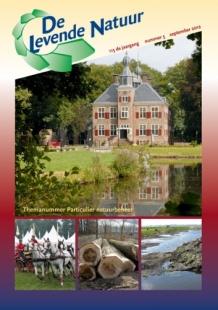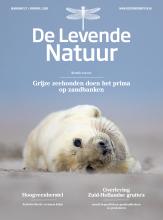De Levende Natuur nummer 5 van 2012 (English summary)
Thema
Afbeelding

Private nature conservation - what’s that?
E.J.M. Aertsen
Nature in The Netherlands is largely a product of private landownership, established long before there were nature- and environmental plans. Think of the estate forests, moors, wader areas. Many of these nature areas are lost in recent decades under the pressure of economic growth in our country. But in many private areas, particularly the estates, the old nature has been saved.
Every landowner has certain motives for keeping and preserving their estates. Those motives form the key elements for making the choices that address the needs and demands of society.
But making a profit out of their estates is not the one and/or only reason. For many private landowners their estate, including the preservation of it, is not something they choose to do so, but is an obligation to the ancestors as well as the future generation(s) to come.
The practice of nature conservation by private landowners
M.F.F.W. Jans
Based on their personal experience, the authors give an overview of nature conservation by private landowners in The Netherlands. Having inherited or created a private estate, the owner’s aim is to keep the estate in the family on an economically sustainable basis. Nature conservation is not often their primary goal. Their ambitions as regards nature quality are limited by the financial framework. Most estate owners lack professional training. While some of them take a DIY-approach, others choose to form partnerships with professional nature conservationists. The results of the latter group in terms of nature quality are equal to those of professional nature conservation organisations.
Nature development by private land owners to create the National Ecological Network?
M.E. Sanders
Many cabinets gave private land owners a more prominent role in nature development projects to create the National Ecological Network. Several land owners took this opportunity to make a change from agricultural production to nature conservation but not as many as targeted. The government took much effort to promote nature development by private land owners and made it financially more attractive. But still it is a radical and irreversible procedure which one only should go through with proper motivation.
Nature development by private land owners on former agricultural land
W. van Boschinga
Since 2000 private land owners have a more prominent role in nature development projects to create the National Ecological Network. Though the government compensates financially for costs and investments, the procedure is very complicated and a risky venture. When something goes wrong, and that isn’t uncommon in these complicated procedures, the financial risk is for the land owner. Despite these risks, many landowners are still motivated to join nature development projects. Several governmental organisations make sure that projects are completed according to agreed plans. After twelve years the results vary from successfully developed natural habitats to no difference from common agricultural land.
Nature restoration by Effect-Oriented Measures; Forest Support Group
N. de Kort-Langeveld, A.J.M. Jansen & M.F.F.W. Jans
Since 1995 the Forest Support Groups have followed the vegetation development two, five and ten years after taking restoration measures. These measures, named ‘Effectgerichte Maatregelen (EGM)’ -could be translated as Effect-Oriented Measures- have been financed by the Ministry of Agriculture, Nature and Food safety to counteract the negative impacts of desiccation, acidification and eutrophication as long as their causes (desiccation and atmospheric nitrogen and sulphur deposition) not could be removed. The monitoring revealed that the measures were mostly successful: many ‘Red List’ species (threatened species) characteristic of endangered ecosystems did profit i.e. have established or have expanded, especially in wet habitats such as wet heathlands, fens, soft water lakes and small bogs. Most successful were measures aimed at the removal of nutrients (sod cutting, dredging) and carried out in combination with hydrological measures. The cause of the limited recovery of Red List species of dry habitats is probably the fact that the measures (usually removing nutrients) were insufficient to counteract the acidification of the top soil and the lack of viable seeds (most of these species have short-lived seeds). Despite the increase in biodiversity on the properties of the members of the Forest Support Groups the Ministry has stopped the EGM grant. This is very unfortunate!
Nature 2000 offers possibilities for private landowners
M. van der Veen
The Veluwe is a natural area of about 90.000 ha in the eastern part of The Netherlands, north of Arnhem. The Veluwe will be designated as a Nature 2000 area. According to Dutch Law, a management plan is developed, in which measures are described to realise Nature 2000 goals. About one third of the Veluwe is privately owned. In this article the consequences of the designation and the management plan for private landowners are described. It is argued that the restrictions due to Nature 2000 are limited and that chances for natural and even economic development of estates are increased.
Private nature management and forest
E.A.H Thomassen & M.F.F.W. Jans
Private forest owners in The Netherlands own a third of the Dutch forest. Private owners are a very diverse category regarding their management, but they share a common interest in preserving their property and keeping it within the family. Traditionally they have managed these forests for profit and their own leisure, with their own ideas, which has resulted in some of the most interesting estates in the country. Wood production is an integral part of the forest management for most owners, as it is –besides subsidies- the only source of income from the forest, which can be used to cover costs.
In the last few decades interest in natural values is on the rise and principles of nature oriented forestry have been adopted by most owners. Indigenous tree species cover and dead wood have increased in privately owned forests, partly due to government grants. A further increase of natural values in the forests is expected, but this trend might be negatively affected by changes in subsidies and the rise of timber prices in the last few years. However the increase in timber prices can also be used to negate the influence of dwindling subsidies and allow for some investments in biodiversity within privately owned forests.
Entrepreneurship is essential for successful combination of recreation and nature
Based on Porter’s Diamant the authors describe the key factors for successful management of private estates as support for the quality of nature. Those key-factors are entrepreneurship, balance in supply and demand and networking. Successful entrepreneurship includes the principles of shared values. Nature quality can be guaranteed by good knowledge and high ambition, following good entrepreneurship.

